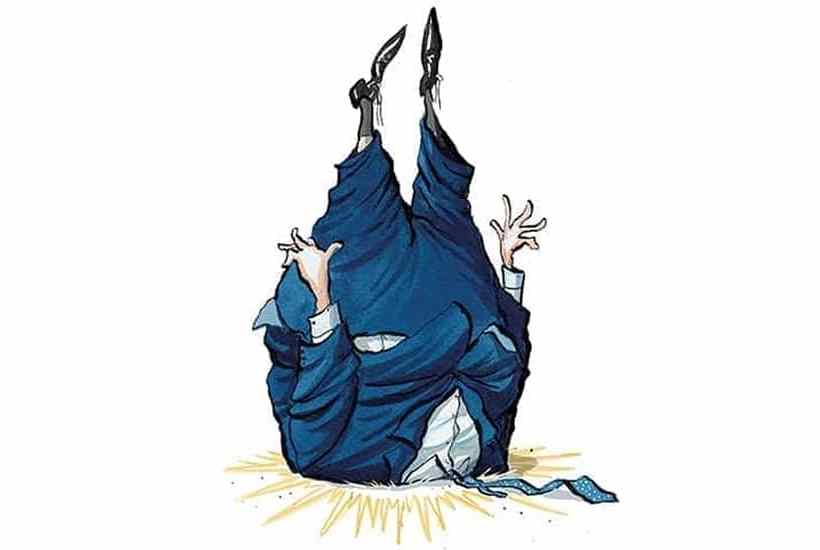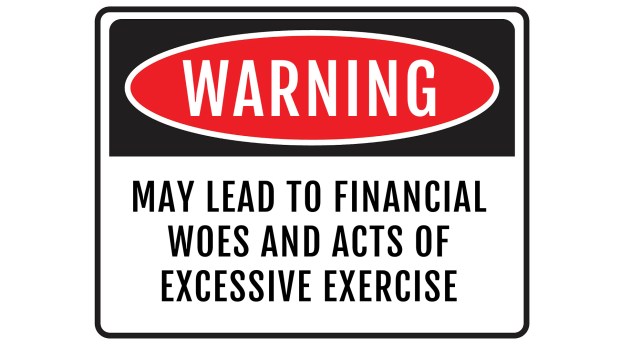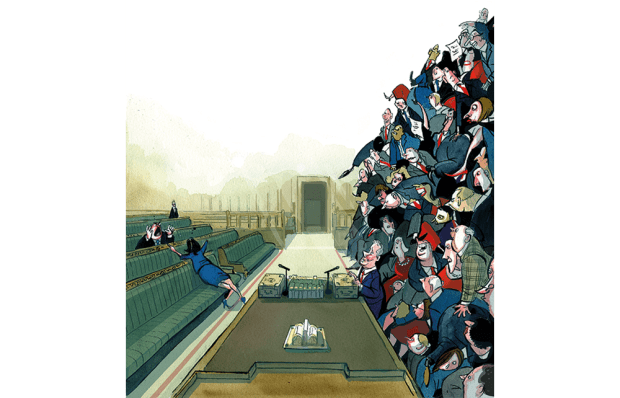The lie’s the thing
Sir: Your leading article (‘Partygate’s hangover’, 2 April) maintains that if the Prime Minister receives a fixed penalty notice, he shouldn’t have to resign. No fair-minded person would disagree with this, for such a resignation would indeed be absurd. However, there is a more serious issue. The Prime Minister repeatedly assured the House of Commons that all Covid guidelines were followed in Downing Street. If it is found that he knowingly misled MPs with these claims, then the Ministerial Code is entirely clear: he would have to resign.
John Hatt
Firbank, Cumbria
Thatcher’s war
Sir: Charles Moore writes that if Margaret Thatcher had failed to retake the Falklands, she would probably have had to resign (Notes, 2 April). I believe he is right on that but I would add that her successor would probably have found it difficult to win the next general election. In addition, I think that if Argentina had not invaded the Falklands in the first place, she could well have lost the next general election, because the British victory helped to distract from any adverse effects of her economic policies.
J. Alan Smith
Epping, Essex
West End gulls
Sir: I was delighted to see the article about urban gulls (‘Gull power’, 2 April). It is reassuring that those of us who have been fighting the intransigence of Natural England for some years are not alone in recognising the menace of the massive population explosion about to be visited on the country.
Gloucester City Council first took gull control measures in 2009 after surveys showed an annual increase in gull numbers of some 16 per cent. The controls involved oiling or removal of eggs and removal of nests from city centre rooftops. This reduced the annual population growth to about 3 per cent.
The removal of gulls from the general licence at the start of 2020 means that our efforts have ceased, which undoes the work of years and wastes well over £100,000 spent on gull mitigation measures. It is reasonable to assume that population growth will increase to 16 per cent again and those gulls will spread into more areas of the country as they look for safe, uncrowded nesting sites.
Natural England’s offer of organisational licences to allow control measures to take place is wholly inadequate. The licences require huge investment into form filling, which a trial in Worcester and Bath showed was quite ineffective, allowing only one in ten nests to be dealt with, thereby having a negligible effect on population growth.
Gulls which fledged in 2020 and 2021 will return inland to mate two or three years after fledging, so we will see the start of that population explosion this year, increasing inexorably year on year. Government be warned.
Richard Cook
Cabinet member for environment and leader of Gloucester City Council
Going it alone
Sir: Rod Liddle is my stiffest weekly tonic, for which I am truly grateful. In this wearying, toxic and combative world, he writes and I laugh. However, I would take issue with one comment he made in his article ‘What I learnt in sex education’ (26 March). That is that the variation of parenting which has ‘unequivocally the best outcomes for children is to be brought up by two people – one a man, the other a woman – who are the married genetic parents of the children in question’. While I would not disagree with this assertion, there are many success stories where a child was brought up by a single parent. I left an abusive marriage when my children were five and three. The eldest went to Cambridge and is now doing an MA in Leipzig; the other went to Oxford and is now doing an MA in Leiden. More importantly, they are kind, confident, loving, articulate and sensitive young men. But I have not yet asked them if they would have liked me to talk to them about gender.
Emma Rose Barber
East Sussex
Ziren call
Sir: When we were doing infantry training on Salisbury Plain during the formidable winter of 1947, my fellow privates in the Gloucestershire Regiment would talk about Saturday nights out in ‘Ziren’ (Mind your language, 26 March). I don’t think Cirencester was referred to by any other name. During that winter, we were sent home for three weeks’ extra leave because the army ran out of both fuel to keep the barracks unfrozen and food to feed us.
David Lane
London W1
Crackersnack
Sir: Long before the introduction of potato crisps and the sandwiches which included them (Notes on… crisp sandwiches, 2 April), the Rossendale Valley had the Crawshaw booth sandwich: two slices on unbuttered bread with a cream cracker in between. It was popular in the early part of the last century. With food prices about to rocket, perhaps it will make a comeback.
Chris Aspin
Helmshore, Lancashire
Hail, Columba
Sir: All kudos to Doc and the current team of crossword compilers for entertaining us in these pages each week. But what an unexpected pleasure to have the peerless Columba back one more time (Crossword 2549, 2 April) with a typically clever challenge. I’ve been enjoying the Spectator crossword for longer than I care to remember, back to the time of Jac and Daedalus. Columba’s intricate and precisely clued puzzles were a consistent delight.
Thank you Columba, thank you Doc and the team. Keep up the good work.
Richard Stone
Barton-under-Needwood, Staffs
Got something to add? Join the discussion and comment below.
Get 10 issues for just $10
Subscribe to The Spectator Australia today for the next 10 magazine issues, plus full online access, for just $10.
You might disagree with half of it, but you’ll enjoy reading all of it. Try your first month for free, then just $2 a week for the remainder of your first year.














Comments
Don't miss out
Join the conversation with other Spectator Australia readers. Subscribe to leave a comment.
SUBSCRIBEAlready a subscriber? Log in